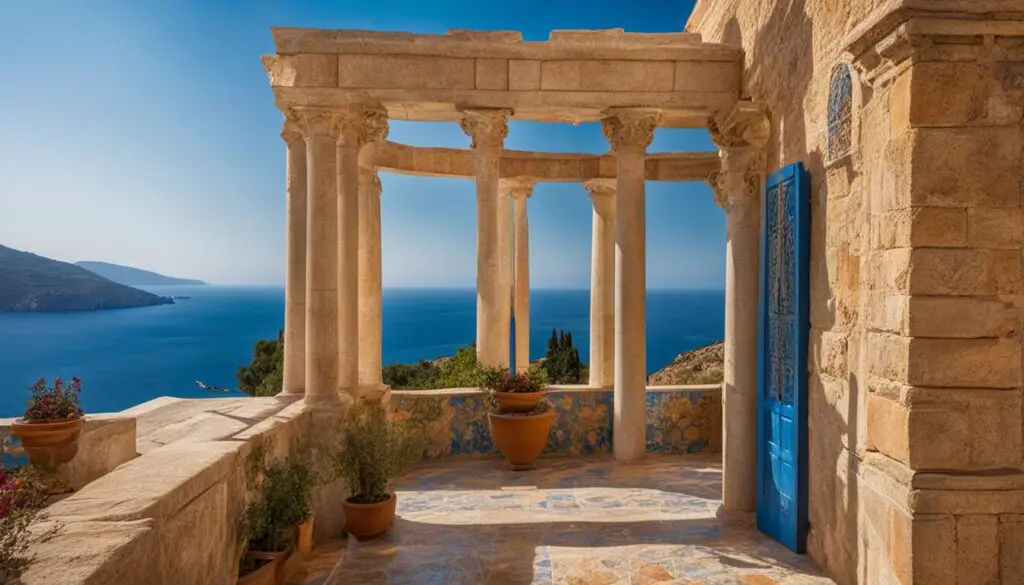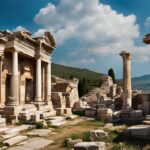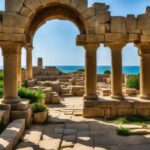Greece, a land renowned for its captivating beauty and rich history, beckons adventure seekers and culture enthusiasts from around the world. From the stunning Greek islands to the ancient ruins that stand as a testament to its glorious past, Greece offers a myriad of experiences that will leave you awe-inspired. Immerse yourself in the vibrant Greek culture, indulge in mouthwatering cuisine, and bask in the sun-kissed beaches that adorn its picturesque coastline.
Discover the biblical importance of Greece, where notable figures like the Apostle Paul left their mark and significant events unfolded. Uncover the architectural treasures that have influenced Western design for centuries and explore the scenic beauty of the Greek islands that captivate travelers with their breathtaking landscapes. With a thriving tourism industry and practical tips to enhance your journey, visiting Greece promises an unforgettable adventure that combines history, culture, and natural wonders.
Key Takeaways:
- Greece offers a perfect blend of adventure and culture, making it an ideal destination for travelers.
- Greek history is deeply intertwined with biblical figures and events, leaving a lasting impact on the country’s development.
- Explore the scenic beauty of the Greek islands, with their stunning beaches and picturesque architecture.
- Indulge in the gastronomic delights of Greek cuisine, known for its rich flavors and healthy ingredients.
- Immerse yourself in the timeless beauty of Greek architecture, from ancient temples to traditional island houses.
The Biblical Importance of Greece
Greece holds significant biblical importance due to its association with various notable figures and events. In biblical times, Greece was an important center of trade and culture, playing a role in the spread of Christianity.
Notable biblical figures linked to Greece include the Apostle Paul, who wrote letters to the early Christian communities in Greece and visited places like Athens and Corinth. Additionally, Greece was the setting for major biblical events such as the visit of the Apostle Paul to Athens and the preaching of the Gospel in Corinth. These events had a lasting impact on the history and development of Christianity in Greece.
Biblical Figures Linked to Greece
| Figure | Biblical Role |
|---|---|
| Apostle Paul | Wrote letters to early Christian communities in Greece and visited Athens and Corinth |
| Timothy | Worked with Apostle Paul in Greece |
| Aquila and Priscilla | Hosted Apostle Paul in Corinth |
Biblical Events in Greece
- Visit of the Apostle Paul to Athens
- Preaching of the Gospel in Corinth
- Establishment of early Christian communities in Greece
Greece’s biblical importance is a testament to its historical and cultural significance. Visitors to Greece can explore these biblical connections and gain a deeper understanding of the role the country played in the spread of Christianity.
Greek Islands: Exploring Scenic Beauty
The Greek islands are a true paradise, offering visitors unparalleled scenic beauty and a chance to immerse themselves in the Mediterranean charm. With over 6,000 islands and islets scattered across the Aegean and Ionian Seas, each island has its own unique character and allure. From the bustling cosmopolitan vibe of Mykonos to the peaceful tranquility of Milos, there is an island to suit every traveler’s preferences.
The Greek islands are renowned for their stunning beaches, with crystal-clear turquoise waters and golden sands. Whether you prefer secluded hidden coves or lively beach resorts, there is a beach for everyone. Some of the top beaches in Greece include Navagio Beach in Zakynthos, Elafonisi Beach in Crete, and Sarakiniko Beach in Milos. These beaches offer not only a place to relax and soak up the sun but also the opportunity to indulge in exciting water sports and activities.
Table: Must-Visit Greek Islands and Their Unique Features
| Island | Unique Feature |
|---|---|
| Santorini | The iconic whitewashed buildings, breathtaking caldera views, and romantic sunsets. |
| Mykonos | The vibrant nightlife, beautiful sandy beaches, and charming Cycladic architecture. |
| Crete | The rich history and culture, stunning landscapes, and world-class cuisine. |
| Rhodes | The medieval Old Town, ancient ruins, and beautiful coastal scenery. |
| Corfu | The Venetian-style architecture, lush greenery, and pristine beaches. |
In addition to their natural beauty, the Greek islands are also known for their unique architecture. The Cycladic architecture, characterized by the iconic whitewashed buildings with blue-domed roofs, is a symbol of the Greek islands. Walking through the narrow cobblestone streets of villages like Oia in Santorini or Chora in Mykonos is like stepping back in time. The traditional architecture blends harmoniously with the natural landscape, creating a picturesque and charming atmosphere.
Each Greek island also has its own distinct cultural heritage and historical sites to explore. From the archaeological wonders of Delos, the birthplace of Apollo and Artemis, to the ancient city of Knossos in Crete, where the Minoan civilization thrived, the islands are a treasure trove of history and culture. Visitors can uncover the stories of ancient civilizations, visit ancient temples and ruins, and gain a deeper understanding of Greece’s rich past.

Whether you’re seeking a romantic getaway, a family-friendly vacation, or an adventure-filled trip, the Greek islands offer something for everyone. The stunning scenery, beautiful beaches, unique architecture, and rich cultural heritage make the Greek islands a bucket list destination. So pack your bags, book your tickets, and embark on a journey to explore the scenic beauty of the Greek islands.
Greek Cuisine: A Gastronomic Delight
Greek cuisine is a gastronomic delight that is loved and appreciated by food enthusiasts around the world. With its emphasis on fresh ingredients, bold flavors, and healthy cooking methods, Greek food offers a unique culinary experience that tantalizes the taste buds and nourishes the body.
One of the key elements of Greek cuisine is the abundant use of olive oil, which is not only rich in flavor but also has numerous health benefits. Olive oil is the foundation of many Greek dishes, used for cooking, dressing salads, and drizzling over grilled meats and vegetables. It adds a distinct Mediterranean touch to the cuisine and is a testament to Greece’s rich agricultural heritage.
When it comes to traditional Greek dishes, one cannot miss out on classics like moussaka, a layered dish of eggplant, minced meat, and béchamel sauce, and souvlaki, succulent skewers of marinated meat grilled to perfection. These dishes exemplify the simplicity and heartiness of Greek cuisine, showcasing the flavors of the region in every bite.
Another iconic Greek dish is tzatziki, a refreshing yogurt and cucumber dip that is the perfect accompaniment to grilled meat or as a spread in sandwiches. The combination of tangy yogurt, crisp cucumber, and fragrant garlic creates a harmonious blend of flavors that is both cooling and delicious.
| Dish | Description | Image |
|---|---|---|
| Moussaka | A layered dish of eggplant, minced meat, and béchamel sauce. | |
| Souvlaki | Succulent skewers of marinated meat grilled to perfection. | |
| Tzatziki | A refreshing yogurt and cucumber dip, perfect for grilled meat or as a spread. |  |
Greek cuisine is a true reflection of the country’s rich heritage and vibrant culture. It is a celebration of flavors, traditions, and the abundant natural resources that Greece has to offer. From the simplicity of its ingredients to the complexity of its flavors, Greek cuisine is a journey for the senses. Whether you’re enjoying a traditional moussaka or savoring a plate of freshly caught grilled fish, every bite tells a story of Greece’s culinary legacy.
In recent years, Greek cuisine has gained global recognition and popularity, with Greek restaurants and food products making their mark in international markets. The use of fresh, local ingredients, along with traditional cooking techniques passed down through generations, sets Greek cuisine apart from the rest.
Today, visitors to Greece have the opportunity to indulge in the country’s culinary delights. From tavernas serving homemade dishes to high-end restaurants showcasing innovative Greek cuisine, there is something to satisfy every palate. Greek cuisine not only offers a delicious dining experience but also provides a deeper understanding of the country’s history, culture, and way of life.
The Rich History of Greece: Uncovering Ancient Treasures
Greece is a country that stands as a living testament to its ancient history. From the stunning ruins of Athens to the ancient city of Knossos in Crete, visitors have the opportunity to uncover the treasures of Greek history. In biblical times, Greece played a significant role in the spread of Christianity, with notable figures like the Apostle Paul leaving a lasting impact on the region.
Table: Famous Historical Landmarks in Greece
| Landmark | Location | Significance |
|---|---|---|
| The Acropolis | Athens | Ancient citadel featuring the iconic Parthenon and other ancient buildings. |
| The Palace of Knossos | Crete | Archaeological site showcasing the remains of the Minoan civilization. |
| Olympia | Peloponnese | The birthplace of the Olympic Games and home to ancient athletic facilities. |
| Delphi | Mainland Greece | Ancient sanctuary dedicated to the god Apollo, known for its oracle. |
These historical landmarks not only offer insights into the past but also provide a glimpse into the architectural brilliance and cultural richness of ancient Greece. The intricate details and grandeur of structures like the Parthenon showcase the exceptional craftsmanship and artistic prowess of the ancient Greeks.
“Greece is a treasure trove of historical landmarks, each with its own unique stories and significance.” – Travel enthusiast
The Impact of Greek History on Western Civilization
The influence of Greek history on Western civilization cannot be overstated. The concepts of democracy, philosophy, and scientific inquiry originated in ancient Greece and continue to shape our modern world. The philosophical teachings of Socrates, Plato, and Aristotle have profoundly influenced Western thought, while the democratic principles upheld in ancient Greek city-states set the foundation for modern democratic systems.
- Greece’s rich history also extends to the realm of literature and the arts. The epic poems of Homer, such as the “Iliad” and the “Odyssey,” are considered masterpieces of world literature and have inspired countless works of art and literature throughout the ages.
- The architectural styles developed in ancient Greece have had a lasting impact on Western architecture. The use of columns, symmetry, and proportion in Greek architecture can be seen in iconic structures around the world, including government buildings and museums.
Despite the passage of time, Greece continues to preserve and celebrate its historical heritage. Archaeological excavations and ongoing preservation efforts ensure that future generations can also uncover the mysteries and marvel at the ancient treasures of this remarkable country.

Through its rich history and ancient treasures, Greece offers visitors a unique opportunity to delve into the foundations of Western civilization. Exploring archaeological sites, marveling at ancient temples, and experiencing the cultural legacy left by the ancient Greeks are experiences that will leave a lasting impression.
Greek Architecture: From Ancient to Modern
Greek architecture is renowned for its iconic designs and enduring influence on Western architectural styles. From the grandeur of ancient temples to the simplicity of traditional island houses, Greek architecture reflects the country’s rich history and cultural heritage. The Parthenon in Athens and the Temple of Apollo in Delphi are prime examples of classical Greek architecture that continues to inspire architects and artists to this day. Visitors to Greece can marvel at these architectural wonders and appreciate the timeless beauty of Greek design.
The ancient Greeks were pioneers in architectural innovation, developing the three classical orders – Doric, Ionic, and Corinthian – that still form the foundation of many architectural styles around the world. These orders dictated the proportions, ornamentation, and structure of buildings, ensuring a harmonious balance between form and function. Greek architects also perfected the use of columns, creating impressive colonnades that added a sense of grandeur and elegance to their structures.
Greek architecture is characterized by its emphasis on balance, symmetry, and harmony. The meticulous attention to detail and the use of mathematical principles contributed to the creation of buildings that are not only visually stunning but also structurally sound. This precision and craftsmanship can be seen in the intricate carvings, decorative friezes, and smooth marble surfaces that adorn many Greek temples and buildings.
Biblical Significance of Greek Architecture
In biblical times, Greece played a significant role in the spread of Christianity and became an important center for early Christians. The Apostle Paul, one of the most influential figures in early Christianity, visited Greece and preached in places like Athens and Corinth. The biblical events that took place in Greece, such as the preaching of the Gospel and the establishment of Christian communities, shaped the history of Christianity in the region.
Today, Greek architecture continues to inspire architects and artists around the world. Its timeless beauty and enduring influence can be seen in modern buildings that pay homage to the classical Greek style. By preserving and appreciating Greek architecture, we not only honor the rich heritage of Greece but also celebrate the lasting legacy of this exceptional architectural tradition.

Greek Architecture: A Brief Overview
| Architectural Style | Main Characteristics |
|---|---|
| Doric | Simple, sturdy columns with no base and a plain, geometric capital |
| Ionic | More slender columns with a base and capital adorned with volutes |
| Corinthian | Elegant columns with a base and intricate capital decorated with acanthus leaves |
| Use of Columns | Columns played a central role in Greek architecture, providing structural support and adding aesthetic appeal. The Greeks developed different column orders, which influenced architectural styles for centuries. |
| Attention to Detail | Greek architecture is characterized by its meticulous attention to detail, from the intricate carvings and decorative friezes to the smooth marble surfaces. Every element of the building was carefully considered to achieve a harmonious and visually pleasing composition. |
| Influence on Western Architecture | The architectural principles and styles developed by the ancient Greeks have had a profound influence on Western architecture. Even today, many buildings around the world draw inspiration from Greek design, paying homage to its timeless beauty and enduring legacy. |
Greek Beaches: Sun, Sand, and Relaxation
Greece is famous for its crystal-clear turquoise waters and pristine beaches. With thousands of kilometers of coastline, the country offers a wide variety of beach destinations for every preference. From the popular beaches of Mykonos and Santorini to the secluded coves of the Ionian Islands, Greece has something for everyone. Whether you’re looking for a lively beach party scene or a tranquil spot to unwind, the Greek beaches cater to all types of travelers seeking relaxation and natural beauty.
The Greek beaches are known for their picturesque beauty and inviting waters. The golden sandy shores, framed by stunning cliffs and lush vegetation, create a breathtaking backdrop for beachgoers. The clear blue waters of the Aegean and Ionian Seas offer the perfect opportunity for swimming, snorkeling, and other water activities.
One of the most iconic beaches in Greece is Myrtos Beach in Kefalonia. Nestled between towering cliffs, Myrtos Beach boasts azure waters and a captivating setting. Elafonisi Beach in Crete is another must-visit beach, known for its pink sand and shallow turquoise lagoons. These are just a few examples of the many stunning beaches that can be found throughout the Greek islands and mainland.
For those seeking a quieter beach experience, the lesser-known beaches of Vryssi in Rhodes or Tsigrado on the island of Milos offer seclusion and tranquility. These hidden gems provide a peaceful escape where visitors can bask in the sun and enjoy the serenity of the surrounding nature.

Table: Top Beaches in Greece
| Beach | Location | Features |
|---|---|---|
| Myrtos Beach | Kefalonia | Picturesque setting, azure waters |
| Elafonisi Beach | Crete | Pink sand, shallow turquoise lagoons |
| Vryssi Beach | Rhodes | Secluded, peaceful |
| Tsigrado Beach | Milos | Hidden gem, tranquil |
Whether you choose to relax on the popular beaches or explore the hidden treasures of Greece, the country’s beaches will leave you mesmerized. The combination of natural beauty, warm hospitality, and the laid-back Greek lifestyle make the beach experience in Greece truly unforgettable.
Greek Tourism: A Thriving Industry
Greece is a country that has long been associated with tourism, attracting millions of visitors from around the world each year. The country’s rich history, stunning landscapes, and vibrant culture make it a top destination for travelers seeking unique experiences. With a thriving tourism industry, Greece has invested heavily in infrastructure and initiatives that enhance the overall visitor experience.
Table:
| Year | Number of Tourists (in millions) |
|---|---|
| 2015 | 24.8 |
| 2016 | 27.2 |
| 2017 | 30.1 |
| 2018 | 33.1 |
| 2019 | 34.2 |
Greek tourism has witnessed a steady increase in recent years, with the number of tourists surpassing 34 million in 2019. This growth can be attributed to various factors, including the country’s diverse attractions and the efforts made by the Greek government to promote tourism. Investments in infrastructure, preservation of historical sites, and initiatives to enhance sustainability have all contributed to Greece’s appeal as a tourist destination.
Furthermore, Greece’s natural beauty and geographic diversity have played a significant role in attracting visitors. From the sun-drenched beaches of the Greek islands to the snow-capped peaks of Mount Olympus, the country offers a wide range of landscapes for tourists to explore. Additionally, Greece’s culinary scene, with its delicious Mediterranean cuisine, has become a major draw for food enthusiasts seeking an authentic gastronomic experience.
Overall, Greek tourism continues to thrive, welcoming visitors from all corners of the globe who come to immerse themselves in the country’s rich history, vibrant culture, and breathtaking scenery. The combination of ancient ruins, picturesque islands, and warm Greek hospitality makes Greece a must-visit destination for travelers seeking a truly memorable experience.
Visit Greece: Practical Tips and Recommendations
Planning a trip to Greece? Here are some practical tips and recommendations to ensure a smooth and enjoyable experience.
Best Time to Visit Greece
If you want to avoid the crowds and enjoy pleasant weather, the best time to visit Greece is between April and May. During this period, the temperature is mild, and you can explore the outdoor attractions without the summer heat. Additionally, the tourist season is just beginning, so you’ll experience fewer crowds and have more options for accommodations and activities.
Languge and Currency
English is widely spoken in tourist areas, but learning a few basic Greek phrases can enhance your interactions with locals and show respect for their culture. In terms of currency, it’s advisable to carry cash, as some small establishments may not accept credit cards. There are plenty of ATMs available throughout the country where you can withdraw Euros.
Off-the-Beaten-Path Destinations
While popular destinations like Athens, Santorini, and Mykonos are must-visits, don’t miss out on exploring off-the-beaten-path destinations in Greece. Places like Nafplio, Meteora, and Delos offer a different perspective and a chance to experience Greece’s hidden gems. These lesser-known locations often boast untouched natural beauty, ancient ruins, and a more authentic cultural experience away from the crowds.
Immerse Yourself in Greek Culture
Greece is a country rich in history and culture, so make sure to immerse yourself in the vibrant Greek way of life. Attend local festivals, visit traditional tavernas, and try the authentic Greek cuisine. Greeks are known for their warm hospitality, so don’t be shy to engage with locals and learn about their customs and traditions.
By following these practical tips and recommendations, you’ll be well-prepared for your trip to Greece. Whether you’re exploring ancient ruins, relaxing on stunning beaches, or indulging in mouthwatering Greek cuisine, Greece promises an unforgettable experience that will leave you with lifelong memories.
Conclusion
Greece is a captivating destination that offers a perfect blend of adventure and culture. Whether you’re a history enthusiast, a beach lover, or a foodie, Greece has something to offer every type of traveler. From exploring ancient ruins to indulging in delicious Greek cuisine, the country provides a sensory experience that will leave you in awe.
One of the significant aspects of Greece is its biblical importance. In ancient times, Greece played a vital role in the spread of Christianity, with notable biblical figures like the Apostle Paul leaving their mark on the country. Visit places like Athens and Corinth to immerse yourself in the historical and spiritual significance of these locations.
Today, Greece continues to captivate visitors with its picturesque islands, crystal-clear beaches, and iconic architecture. The Greek tourism industry has flourished, offering a wide range of accommodations and amenities to cater to the diverse needs of travelers. Whether you want to relax on the stunning beaches or explore the ancient treasures, Greece is waiting to be discovered.
So, if you’re ready to embark on an unforgettable adventure filled with rich culture, breathtaking landscapes, and a deep connection to history, start planning your trip to Greece. Experience the wonders of this remarkable country and create memories that will last a lifetime.
FAQ
When is the best time to visit Greece?
The best time to visit Greece is between April and May, when the weather is perfect for outdoor activities and the crowds are fewer.
Is English widely spoken in Greece?
Yes, English is widely spoken in tourist areas, but knowing a few basic Greek phrases can enhance your interactions with locals.
Should I carry cash or credit cards in Greece?
It’s advisable to carry cash, as some small establishments may not accept credit cards.
What should I try when it comes to Greek cuisine?
Make sure to try local delicacies such as moussaka, souvlaki, and tzatziki, which showcase the unique flavors of Greek cuisine.
What can I expect when exploring ancient ruins in Greece?
Exploring ancient ruins in Greece allows you to immerse yourself in the stories of ancient civilizations and gain a deeper understanding of the foundations of Western culture.
What are some iconic examples of Greek architecture?
The Parthenon in Athens and the Temple of Apollo in Delphi are prime examples of classical Greek architecture that continue to inspire architects and artists to this day.
What makes Greek beaches special?
Greek beaches are famous for their crystal-clear turquoise waters and pristine beauty, offering a wide variety of options for every preference, from popular party scenes to secluded coves.
How important is tourism to Greece?
Tourism is a vital industry in Greece, contributing significantly to the country’s economy. The Greek government has invested heavily in promoting tourism and enhancing the overall visitor experience.
What practical tips should I consider when visiting Greece?
When planning a trip to Greece, it’s important to consider practical tips such as the best time to visit, carrying cash, trying local delicacies, exploring off-the-beaten-path destinations, and immersing yourself in the vibrant Greek culture.







